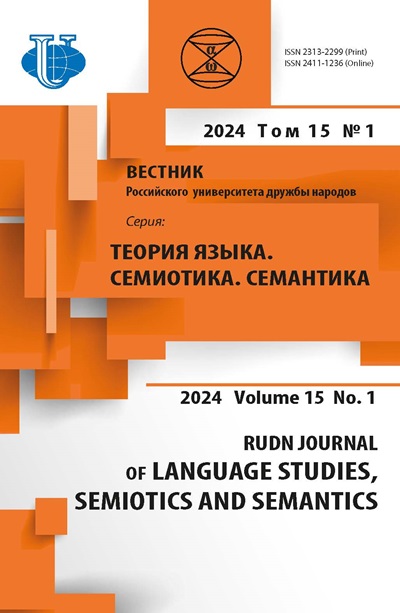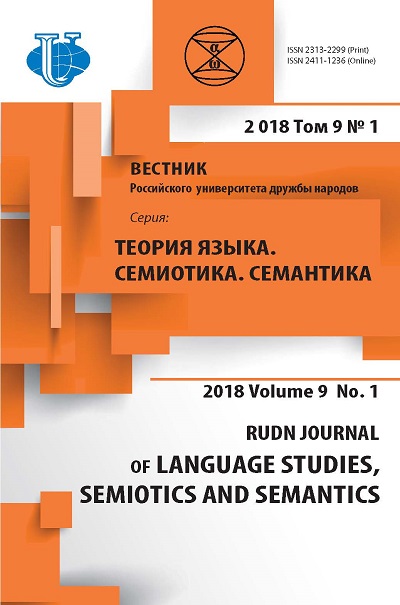Forms of address as a mean of expressing social conflict in the Mikhail Bulgakov’s “Heart of a Dog”
- Authors: Di Z.1
-
Affiliations:
- Saint Petersburg State University
- Issue: Vol 9, No 1 (2018)
- Pages: 223-237
- Section: POLITICAL LINGUISTICS. SCIENCE 21.0
- URL: https://journals.rudn.ru/semiotics-semantics/article/view/18279
- DOI: https://doi.org/10.22363/2313-2299-2018-9-1-223-237
Cite item
Full Text
Abstract
In the speech of characters artistic work, reflecting significant extra-linguistic events reflected historical time and space. Difficult period in post-revolutionary Russia is marked not only by economic problems but also language, one of which is associated with the development of a new system of appeals. The ability of a person to use cases in the implementation of the communications is evidence of its formation as a full-fledged member of society. In “Heart of a Dog” M. Bulgakov, which tells of the formation of a new man, discursive justifiability of various addressing forms are obvious: on one hand, they are an indicator of social stratification, and on the another - to show the socio-ideological confrontation of the Transfiguration and Shvonder. The article discusses the address in the speech of the main characters of the novel, noted the high relevance of pragmatic and discursive weight, which accentuates shown by the author social conflict between the new government and its environment - such as Sharikov and other “proudly” using a form of comrade in its new senses (‘equal’, ‘associate’), and the adherents of the old values - culture, respect to each other, correct and smooth treatment of people and appeals to them. Special attention is paid to the use of forms of dealing with words comrade, citizen, sir, mister , and the reaction of recipients to these forms of address, evidence of mutual rejection of rules of etiquette that are characteristic of the representatives of the proletariat and the intelligentsia. In conditions of ideological and political confrontation, appeals are able not only to characterize the level of cultural and intellectual development regulating the choice of forms of appeals, taking into account different criteria, but also to indicate the place occupied by the speaker in the socio-political orientation system, to express an attitude toward the ideological opponent, they become one of the instruments of influence.
About the authors
Zhang Di
Saint Petersburg State University
Author for correspondence.
Email: wozaizhe.000@163.com
PhD student in Saint Petersburg State University; Interests: linguoculture, paremiology, semantics
7-9, Universitetskaya emb., Saint-Petersburg, Russian, 199034References
- Alysheva, Yu.S. (2012). Speech portrait of V.V. Putin. Bulletin of Volgograd. state. un-ta. Ser. 2. Linguistics, 2(16), 171—174. (in Russ).
- Antipina, S.F. (2006). History of the formation and development of socio-political views M.A. Bulgakov [dissertation]. Voronezh. (in Russ).
- Aslanova, M.G. (2015). Means of creating a positive image in the speech of the politician (based on the text of the second inaugural address by Barack Obama). Political linguistics, 1, 74—82. (in Russ)
- Ahmanova, O.S. (2010). Dictionary of linguistic terms. Moscow: Librokom. (in Russ).
- Balakay, A.G. (2001). Dictionary of Russian speech etiquette. Moscow: AST-PRESS. (in Russ).
- Baranov, A.N. (2003). Introduction to Applied Linguistics. Moscow: Editorial URSS. (in Russ).
- Baranov, A.N. (1991) Parliamentary Debate: Traditions and Innovations. Moscow: Knowledge. (in Russ).
- Bir’ulina, A.I. (2009). Evolution of Russian speech etiquette (based on the literature 19—21 centuries) [dissertation] Tambov. (in Russ).
- Boyko, S.I. (2015). Modifications of the concept of the nation in the binary system of the Russian imitative party membership. Political conceptology, 1. 41—71. (in Russ).
- Bulgakov’s encyclopedia — an electronic resource URL: http://www.bulgak.ru/encyclopaedia.html (in Russ). (accessed: 16.01.2018).
- Vasilyev, A.D. (2009). Games in words: the evolution of the dominant vacathive. Theory of Political Linguistics, 2, 9—25. (in Russ).
- Vasilyev, A.D. (2008). The Evolution of the dominant Vocative as a sociocultural phenomenon. Bulletin of Krasnoyarsk state pedagogical University, 2, 87—89. URL: https://cyberleninka.ru/ article/n/evolyutsiya-dominiruyuschego-vokativa-kak-sotsiokulturnyy-fenomen (in Russ). (accessed: 16.12.2017).
- Vorobiev, V.V. (2006). Linguistic and cultural studies. Moscow: RUDN. (in Russ).
- Gavrilova, M.V. (2017). Linguistic notes on the impact of the public word: on the centenary of the Russian revolution. Political Linguistics, 3, 10—17. URL: https://cyberleninka.ru/article/ n/lingvisticheskie-zametki-o-vozdeystvii-publichnogo-slova-k-stoletiyu-russkoy-revolyutsii (in Russ). (accessed: 16.12.2017).
- Danilenko, O.V. (2011). Sociolinguistic analysis of the dynamics of the functioning of metaphorical models in the Soviet and post-Soviet political discourse (on the basis of the pre-election programs of political parties). Uchenye zapiski Orlovsk. state. un-ta. Ser. Humanities and social sciences, 1, 164—169. (in Russ).
- Zavyalova, E.V. (2007). Mental segment of the nation and its representation (on the example of the Russian concept of citizen) [dissertation] Tambov. (in Russ).
- Ibragim, B. (2004). Types and functions of the Russian address as naming the addressee in different types of literature [dissertation] Moscow. URL: http://www.dissercat.com/conternt/tipy-i-funktsii-russkogo-obrashcheniva-kak-imenovaniva-adresata-v-raznykh-vidakh-slovesnosti (in Russ). (accessed: 08.12.2017).
- Karasik, V.I. (2004). Language Circle: Personality, Concepts, Discourse. Moscow: Gnosis. (in Russ).
- Kormilitsyna, M.A. (2003). On Some Active Processes in the Language of Contemporary Publicism. Russica on the Threshold of the 21st Century: Problems and Prospects: Proceedings of the International Scientific Conference. Moscow: Ilya RAS, pp. 88—96. (in Russ).
- Krapivkina, O. A. (2017). Experience in the analysis of discursive practices as forms of social interaction (based on the material of judicial television shows). Bulletin Tom. state. un-ta. Philology, 46. 21—30. DOI: 10.17223 / 19986645/46/2.
- Krysin, L.P. (2001). Modern literary norm and its codification. Russian language in school, 1, 82—89. (in Russ).
- Larina, T.V. (2003). Category of politeness in English and Russian communicative cultures. Moscow: PFUR. (in Russ).
- Likhachev, D.S. (1989). Notes and observations: from notebooks over the years. Leningrad: Soviet writer. (in Russ).
- Melnik, O.G. (2017). The role of deixis in the interpretation of a work of art. Vestn. Tom. state. un-ta. Philology, 46, 31—42. doi: 10.17223/19986645/46/3. Access mode: http://journals.tsu.ru/ philology/&journal_page=archive&id=1486. Date of circulation: 01/16/2018.
- Ukhvanova-Shmygova, I.F. (Ed). (2000). Methodology of research of political discourse: Actual problems of the content analysis of socio-political texts. Issue 2 / Comp. and Society. Minsk: BSU. (in Russ).
- Nguyen Vu Huong Ti. (2010). On the evolution of the circulation in the Russian language. RUDN Journal of Language Studies, Semiotics and Semantic Semantics, 1, 61—63. URL: https://cyberleninka.ru/article/n/o-dinamike-ispolzovaniya-brasch eniya-v-russkom-yazyke (in Russ). (accessed: 20.12.2017).
- Nesterova, T.V. (2001). Pragmatics of address of anthroponyms. Russian language abroad, 4, 14—20. (in Russ).
- Parshina, O.N. (2005). Strategies and tactics of speech behavior of the contemporary political elite of Russia [dissertation] Saratov. (in Russ).
- Perelgut, NM & Sukhotskaya, E.B. (2013). On the structure of the concept of “political discourse”. Bulletin of Nizhnevartovsk State University, 1, 14—20. URL: https://cyberleninka.ru/ article/n/o-strukture-ponyatiya-politicheskiy-diskurs (in Russ). (accessed: 20.12.2016).
- Rudalev, V.G. (1992). Russian language. The doctrine of the proposal. Tambov. (in Russ).
- Saveleva, E.P. (1991). Nomination speech intentions in the Russian language and their semantic-pragmatic interpretation [dissertation] Moscow. URL: http://cheloveknauka.com/nominatsii-rechevyh-intentsiy-v-russkom-yazyke-i-ih-semantiko-pragmaticheskoe-istolkovanie (in Russ). (accessed: 19.12.2017).
- Savina, E.A. (2005). Mystical motives in prose Bulgakova: “The Dog’s Heart” [dissertation] Moscow. (in Russ).
- Seliverstova, E.I. (2012). Image of the party and its competitor: some features of the pre-election text. Language as a system and activity — 3. Mater. Intern. scientific. Conf. Rostov n / Don, pp. 153—155. (in Russ).
- Ushakov, D.N. (Ed.). (2005). Explanatory dictionary of the Russian language (SRYA). Moscow: Al’ta-Print. (in Russ).
- Mokienko, V. M. & Nikitina, T. G. (Ed.). (1998). Dictionary of the language of the Council of Deputies (TSAS). Kharkiv: Folio-Press. (in Russ).
- Trofimenko, V. & Volgin A. (1991). Let’s Talk about etiquette. Moscow: Moskovskaya Pravda. (in Russ).
- Tubalova, I.V. (2015) The concept of the “Great Patriotic War” in personally oriented discursive practices of everyday people. Rusin, 2, 241—258. (in Russ).
- Formanovskaya, N.I. (1982). You said: “Hello!” (Speech etiquette in our communication). Moscow: Knowledge. (in Russ).
- Formanovskaya, N.I. (2002). The culture of communication and speech etiquette. Moscow: Ikar. (in Russ).
- Helisev, V.E. (2000). Theory of literature. Moscow: High school. (in Russ).
- Tsarkov, P.B. (2009). Political linguistics in the theory and practice of forming party discourse (on the example of the party “United Russia”). World of Linguistics and Communication: an electronic scientific journal. Tver: Tver state. agricultural academy, 1(16), 77—82. (in Russ).
- Chernyak, V.D. (Ed) (2013). Rhetoric: A Textbook for Bachelors / V.А. Efremov [and others]. Moscow: Yurayt Publishing. (in Russ).
- Shapochkin, D.V. (2012). Political Liskurs: conical aspect: monograph. Tyumen: Publishing house Tyumen. state. un-ta. (in Russ).
- Yakob, I.A. (2015). The power of the discourse of media space in the struggle for nomination. Bulletin of Tomsk State University. Philology, 3, 122—134.













